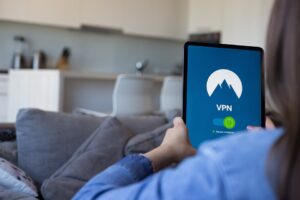The simplest and most efficient approach for users to secure their internet traffic and maintain their privacy online is via a VPN (a virtual private network). Your internet traffic passes through an encrypted tunnel as you join a secure VPN server that no one can look into, not hackers, governments, or your internet service provider. Customers use VPNs to protect their online privacy and guarantee that no outside interference will affect their internet use. With fewer advantages for individuals than a personal VPN, companies use VPNs to connect remote workers as if they were all linked to the same local network at a central office.

Change Your Location
Your IP address, a specific number that recognises you and your location in the world, is changed when you use a VPN. Suppose the VPN service has servers in nearly any country, including the UK, Germany, Canada, Japan, or virtually any other nation. Thanks to your new IP address, you will appear to be in that area when you connect.
Protect Your Privacy
A VPN can help you mask your identity from websites, applications, and services that seek to track you by changing your IP address. Thanks to a layer of robust encryption, effective VPNs also prevent your internet service provider, cell carrier, and anybody else who might be listening from seeing your activity.
Increase Your Security
You are shielded against security breaches in many different ways, such as packet sniffing, unauthorised Wi-Fi networks, and man-in-the-middle attacks, by using a VPN. When using an untrusted network, such as free public Wi-Fi, travellers, remote workers, and all other mobile users need a VPN.
When Should I Use a VPN?
Whenever you access the internet, you should utilise a VPN if privacy is significant to you. No matter what you’re doing online, including browsing, talking, gaming, and downloading, a VPN app functions in the background of your gadget so it won’t get in the way. Additionally, knowing that your privacy is always secured will give you peace of mind.
But here are few instances in which a VPN is especially useful:
While Traveling
You don’t have to change how you use the internet to travel the world. With a VPN, you can browse the web as quietly and securely as if you were physically present.
While Relaxing
Enjoy your spare time without being restricted by ISP throttling or other restrictions imposed by your neighbourhood Wi-Fi network. Do everything you enjoy doing online in peace.
While File-Sharing
P2P file sharing frequently results in the ability for outsiders to view your IP address and track your downloads. By protecting your IP address, a VPN enables you to download it anonymously.
While Gaming
By connecting to a VPN server closer to the game server, you may play with friends from other countries, protect yourself from DDoS attacks, and decrease latency and general lag.
How Does a VPN Work?
To know how a VPN works, it helps first to know how your internet connection works without one.
Proxying
The VPN server serves as a stand-in or proxy for your web activity: The sites you visit will see the IP address and area of the VPN server, not your actual IP address and location. You become more anonymous online as a result of this.
Authentication
An intricate mathematical solution is used to establish a secure connection in a procedure known as authentication. The VPN client and the VPN server can be sure they are speaking to each other and no one else after authentication.
Tunneling
VPNs use tunnelling and encryption to secure client-server communications. Each data packet is encased inside another data packet through tunnelling. This makes it more difficult for people in transit to read.
Encryption
Additionally, information inside the tunnel is encrypted so that only the intended recipient may decrypt it. This entirely protects the privacy of the information in your internet traffic. It won’t even be visible to your internet service provider.
VPN Protocols
The means through which your device connects to the VPN server are known as VPN protocols. Some protocols perform better under specific network conditions, while others are better for speed and security.
Conclusion
To conclude, a virtual private network (VPN) encrypts internet activity and hides your identity while browsing. VPN provides an additional layer of privacy, allows access to foreign websites, and can provide a secure connection for transferring sensitive data. Although typically used by individuals, VPN offers the capacity to manage multiple user accounts, block numerous types of content, and protect your data from prying eyes.

Muhammad Asfandyar is a lawyer having extensive experience in creative content writing, proofreading, legal and academic research writing. He can be reached at asfandyar.edw@gmail.com
